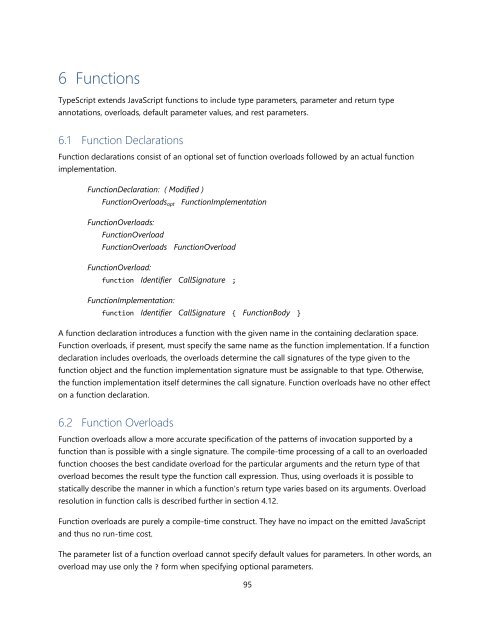TypeScript Language Specification v1.5
TypeScript Language Specification v1.5
TypeScript Language Specification v1.5
Create successful ePaper yourself
Turn your PDF publications into a flip-book with our unique Google optimized e-Paper software.
6 Functions<br />
<strong>TypeScript</strong> extends JavaScript functions to include type parameters, parameter and return type<br />
annotations, overloads, default parameter values, and rest parameters.<br />
6.1 Function Declarations<br />
Function declarations consist of an optional set of function overloads followed by an actual function<br />
implementation.<br />
FunctionDeclaration: ( Modified )<br />
FunctionOverloads opt FunctionImplementation<br />
FunctionOverloads:<br />
FunctionOverload<br />
FunctionOverloads FunctionOverload<br />
FunctionOverload:<br />
function Identifier CallSignature ;<br />
FunctionImplementation:<br />
function Identifier CallSignature { FunctionBody }<br />
A function declaration introduces a function with the given name in the containing declaration space.<br />
Function overloads, if present, must specify the same name as the function implementation. If a function<br />
declaration includes overloads, the overloads determine the call signatures of the type given to the<br />
function object and the function implementation signature must be assignable to that type. Otherwise,<br />
the function implementation itself determines the call signature. Function overloads have no other effect<br />
on a function declaration.<br />
6.2 Function Overloads<br />
Function overloads allow a more accurate specification of the patterns of invocation supported by a<br />
function than is possible with a single signature. The compile-time processing of a call to an overloaded<br />
function chooses the best candidate overload for the particular arguments and the return type of that<br />
overload becomes the result type the function call expression. Thus, using overloads it is possible to<br />
statically describe the manner in which a function's return type varies based on its arguments. Overload<br />
resolution in function calls is described further in section 4.12.<br />
Function overloads are purely a compile-time construct. They have no impact on the emitted JavaScript<br />
and thus no run-time cost.<br />
The parameter list of a function overload cannot specify default values for parameters. In other words, an<br />
overload may use only the ? form when specifying optional parameters.<br />
95


















